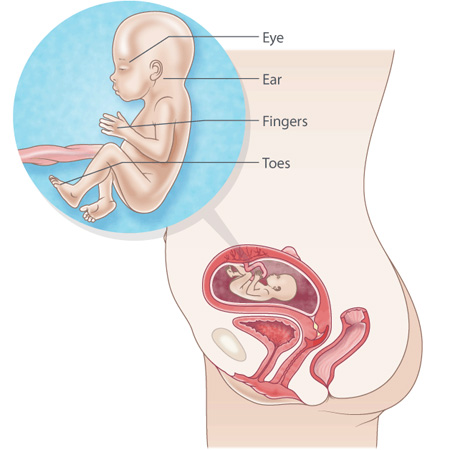You at 18 weeks pregnant
You might be feeling your baby’s movements now – like butterflies in your tummy. But it could still be a few weeks, so don’t worry.

Ultrasound scan at 18-20 weeks
You can have an ultrasound scan at 18-20 weeks of pregnancy to check that your baby is growing healthily and to check the position of your placenta.
This detailed ultrasound is one of the routine tests in pregnancy. It looks at your baby’s body parts and can usually pick up any obvious problems in development or growth, like spina bifida, heart defects and limb defects. You’ll probably see your baby’s heart beating, the curve of their spine, their face, and their arms waving and legs kicking.
If you want to find out the sex of your baby, this is the time to ask.
Emotions in pregnancy
Pregnancy is a time when emotions can change. If you’ve had anxiety or depression in the past, you’re feeling worried or sad, or you’re not enjoying life the way you used to, tell your doctor or midwife.
For information, you can visit the PANDA (Perinatal Anxiety and Depression Australia) website or call PANDA on 1300 726 306. You can also call Beyond Blue on 1300 224 636. Many hospitals have mental health workers who can give you support and counselling.
You and your partner
You might:
- feel more vulnerable and tired than usual and need extra support
- need to talk about the pregnancy more than your partner does
- not feel like sex as often as you used to.
If you have a partner, it’s a good idea to talk about the changes that your baby might bring to your lives.
Even if you feel like your relationship is strong, putting extra effort into communicating openly, working out your roles and sharing expectations is good practice for parenting and staying connected. This ‘relationship work’ can be everything from deciding on paid work arrangements to talking about who cooks dinner.
Your baby when you’re 18 weeks pregnant
This is what your baby is doing now:
- Your baby measures about 14 cm from head to bottom and weighs about 200 g.
- Your baby’s bowel is filling with meconium – this is the hard, black sticky stuff that will come out in your baby’s first poos.
- Your baby is probably resting when you’re active – during the day – and playing at night, when you’re sleeping.
Our Pregnancy for partners section has tips and information for your partner, if you have one. It covers essential topics like antenatal classes, relationships and feelings, wellbeing, birth support and early parenting.